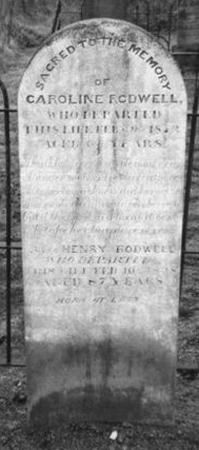
Henry Rodwell, protester and emigrant (1811-1898)
Thanks to Patricia Armstrong for much of the information.
Henry Rodwell was born at East Claydon in 1811, son of Charles and Sarah. In 1834 he married Caroline Pratt (born at Eastbourne in 1809) at St George's Bloomsbury. They had six children:
- Ann b. Quainton 1835
- Emma b. Hampstead 1838
- Charles b. Hampstead 1840
- George b. & d. Aylesbury registration district 1843
- Ruth b. Winslow 1844, d.1849
- Luce b. Winslow 1846, d.1847
The family was in Winslow Workhouse by April 1842 when Henry entered a complaint against the temporary master, matron and schoolmaster. The Guardians set up a committee which found that the complaint was "frivolous vexatious and unfounded". Henry was reprimanded for being "disorderly". He was said to be "on the sick list". Read more.
They had left the Workhouse by 6 June, when it was "ordered that 4s 6d and 6 loaves be given as out relief to Henry Rodwell aged 31 residing at East Claydon and his family weekly during his sickness there certified by the medical officer". Dr John Cowley attested that "Henry Rodwell is afflicted with disease of the heart & spitting of blood & is in a very unfit state for work".
On 19 Dec 1842, the Winslow Guardians paid Aylesbury Union £4 16s "for relief to Henry Rodwell and family belonging to East Claydon". This appears to mean that they were now in Aylesbury Workhouse, for reasons so far unknown. Similar payments continued during 1843. They must have left there by 1844 when Ruth's birth was registered at Winslow, either because they had returned to East Claydon or were back in Winslow Workhouse.
In 1849, Henry, again an inmate of Winslow Workhouse, wrote in his own name and those of three others to the Poor Law Commissioners complaining about the unhealthy conditions there. Read the letter. The Guardians dismissed his complaints and claimed he was a political agitator and Chartist: He "has for years been the cause of a great deal of trouble to the Guardians and their officers both as an in and out pauper. While out of the house he was a very active agent in favor of Mr Feargus O’Connor land scheme and in his residence in the house he has found the means of getting the Northern Star newspaper [a Chartist paper] clandestinely conveyed to him in spite of the Guardians forbidding that it should be allowed. He has been for some time using every effort to promote insubordination in the house and has so far succeeded [that] on two successive days after the writing of the letter to [you] but before the copy of it had been received by me, the Master of the house found it necessary to apply to the Magistrates for protection and on the second application Rodwell was committed for 21 days to the House of Correction at Aylesbury where he is now confined." Caroline also complained to the inspector about not being allowed to attend a Dissenters' meeting.
 Henry wrote another letter of complaint to the Commissioners in 1850 on behalf of some other paupers. Read the letter. The Guardians claimed that the paupers had deliberately knocked down a wall. The inspector agreed with two points made in the letter but dismissed everything else.
Henry wrote another letter of complaint to the Commissioners in 1850 on behalf of some other paupers. Read the letter. The Guardians claimed that the paupers had deliberately knocked down a wall. The inspector agreed with two points made in the letter but dismissed everything else.
The relieving officer Robert Gurney then paid £12 for Henry, Caroline and their three surviving children to emigrate to Australia. Henry was described as a farm labourer, Caroline as a lacemaker and Ann as a house servant. The party also included their daughter Emma aged 13 and son Charles aged 11. They travelled on the Lord Stanley and arrived in New South Wales on 27 Aug 1850.
Things must have improved in Australia. Henry bought 27 acres of land at Bathurst NSW in 1859. He donated two acres to build the Perthville Methodist Church in 1863 (it later became the Perthville Uniting Church). Read about the church, which closed in 2018.
Charles the son married in Australia Phoebe Hannah Budd. She was born at Winslow in 1844, daughter of William and Mary (nee Alderman) Budd. They emigrated in 1848 with assistance from the poor rates. Read more.
Henry died in 1898 aged 87. He and Caroline, who predeceased him, were buried in the Perthville cemetery. The photo on the right shows their gravestone.
Back to Families / People
